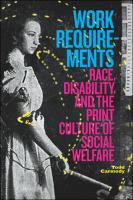Work Requirements
Race, Disability, and the Print Culture of Social Welfare
Author(s)
Carmody, Todd
Collection
Knowledge Unlatched (KU)Language
EnglishAbstract
Throughout the history of the United States, work-based social welfare practices have served to affirm the moral value of work. In the late nineteenth century this representational project came to be mediated by the printed word with the emergence of industrial print technologies, the expansion of literacy, and the rise of professionalization. In Work Requirements Todd Carmody asks how work, even the most debasing or unproductive labor, came to be seen as inherently meaningful during this era. He explores how the print culture of social welfare—produced by public administrators, by economic planners, by social scientists, and in literature and the arts—tasked people on the social and economic margins, specifically racial minorities, incarcerated people, and people with disabilities, with shoring up the fundamental dignity of work as such. He also outlines how disability itself became a tool of social discipline, defined by bureaucratized institutions as the inability to work. By interrogating the representational effort necessary to make work seem inherently meaningful, Carmody ultimately reveals a forgotten history of competing efforts to think social belonging beyond or even without work.
Keywords
Social Science; People With Disabilities; Social Science; Ethnic Studies; American; African American & Black StudiesISBN
9781478015444, 9781478018070, 9781478022688Publisher
Duke University PressPublisher website
https://www.dukeupress.edu/Publication date and place
2022Grantor
Imprint
Duke University PressClassification
Disability: social aspects
Ethnic studies


 Download
Download